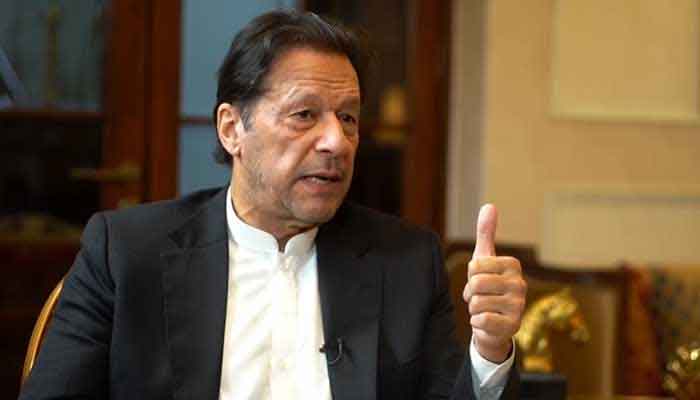- Arrest warrant suspended till March 16.
- Court had ordered police to produce Khan before it by March 29.
- Islamabad police team in Lahore to execute arrest warrant.
ISLAMABAD: A district and sessions court suspended on Tuesday Pakistan Tehreek-e-Insaf (PTI) Chairman Imran Khan‘s arrest warrant issued against him in the case regarding his controversial remarks against a female judge during a rally in Islamabad till March 16.
The development came after the former prime minister filed a petition in the court challenging the arrest warrant. His petition was heard by additional sessions judge Faizan Haider Gillani.
A day earlier, senior civil judge Rana Mujahid Rahim had issued Khan’s non-bailable arrest warrant for repeatedly failing to appear before the court after which a police party from the federal capital flew to Lahore by helicopter to arrest the PTI chairman.
Khan skipped the hearing and filed an exemption plea from physically appearing before the judge, requesting permission for joining the court proceedings virtually via video link.
The court had dismissed the deposed premier’s plea — whose government was ousted from power after a no-confidence motion in April last year — and ordered the police to produce Khan before it by March 29.
Today’s hearing
At the outset of the hearing, the former premier’s legal team — comprising lawyers Naeem Haider Panjotha and Intezar Haider Panjotha — challenged the arrest warrants on Khan’s behalf.
Imran Khan’s counsel, when presenting their arguments, said the provisions imposed on the PTI chief are all bailable.
Judge Gillani asked if bailable arrest warrants were issued earlier to which the lawyer responded in the negative.
The court directed Khan’s lawyers to fix the relevant documents in the case and provide it again as the judge said he was struggling to understand the documents that had been submitted.
The lawyers argued that Khan is a former premier and it is the government’s responsibility to provide him security. “The government has withdrawn security from Imran Khan,” the PTI chief’s lawyer said.
The judge questioned if there was a letter mentioning the withdrawal of Khan’s security and asked the lawyer to provide it by tomorrow (Wednesday). The judge also commented over the start of the former premier’s campaign.
“Imran Khan appeared in the judicial complex,” the lawyer said.
The government prosecutor, in his arguments, said that Khan was also summoned in the Toshakhana case.
During the hearing, the judge remarked that Khan appeared in the judicial complex but not before the katchehri.
“The katchehri was attacked in 2014, did it shift after that?” inquired judge Gillani, adding that the katchehri did not even shift when Imran Khan was in power.
“Tell me about the PTI’s single legal reform,” he added.
The judge said that Khan can come to the katchehri as he has appeared there before as well.
He further remarked that the court called for Khan to give him copies of the case. “The copies of the case are provided to the suspect in a personal capacity and not to anyone else,” he said.
The prosecutor said whether the sections are bailable or not, they are not related to the warrant.
“Security has been retracted from Imran Khan and this is my case,” said Khan’s counsel.
The judge asked the counsel to provide a letter to the court in this regard.
The lawyer pleaded for a date in March, as Khan’s petition to appear via video link has also been submitted in the Islamabad High Court.
“You know what will happen on video link. I’ll give you two months,” the judge said.
The lawyer said he cannot appear due to personal engagements, requesting the court for Thursday’s date.
After this, the court issued notices to the parties and ordered Khan’s lawyers to produce documents related to withdrawal of Khan’s security.
The hearing was then adjourned till March 16.


 Entertainment2 days ago
Entertainment2 days ago
 Latest News1 day ago
Latest News1 day ago
 Latest News1 day ago
Latest News1 day ago
 Latest News1 day ago
Latest News1 day ago
 Latest News1 day ago
Latest News1 day ago
 Entertainment2 days ago
Entertainment2 days ago
 Latest News1 day ago
Latest News1 day ago
 Latest News1 day ago
Latest News1 day ago
























